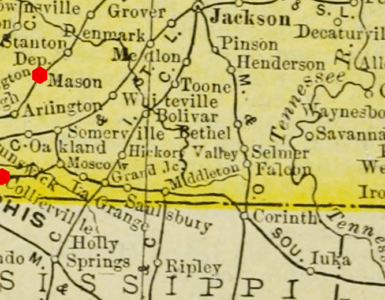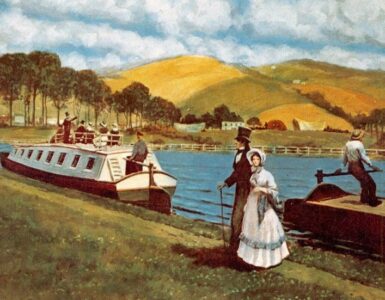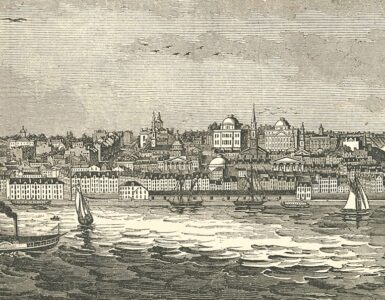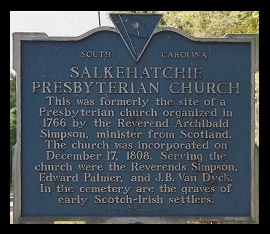 The state of South Carolina is rich with Presbyterian and Reformed history because of its early settlement by Presbyterian Ulster Scots, Highlanders, Hebrideans, and others from the land of tartans and the Emerald Isle, as well as the Huguenots who were Reformed immigrants from France. The extensive influence of these settlers who were seeking religious freedom and economic opportunity is represented currently in a number of historic sites, cemeteries, and churches in the Palmetto State. One site is the remnant of the Salkehatchie Presbyterian Church which is located about three miles north of Yemassee on US Highway 17. The significance of the church is explained on a state historical marker by the road. A section of chain-link fence and abundant shade trees protect the scattered grave stones. The church was organized, as the historical marker notes, by Rev. Archibald Simpson from Scotland in 1766. When Colin McIver was ordained and installed in the Salkehatchie Presbyterian Church for his first pastoral ministry, he began his call in a humid and isolated location with a very different topography and climate than his homeland.
The state of South Carolina is rich with Presbyterian and Reformed history because of its early settlement by Presbyterian Ulster Scots, Highlanders, Hebrideans, and others from the land of tartans and the Emerald Isle, as well as the Huguenots who were Reformed immigrants from France. The extensive influence of these settlers who were seeking religious freedom and economic opportunity is represented currently in a number of historic sites, cemeteries, and churches in the Palmetto State. One site is the remnant of the Salkehatchie Presbyterian Church which is located about three miles north of Yemassee on US Highway 17. The significance of the church is explained on a state historical marker by the road. A section of chain-link fence and abundant shade trees protect the scattered grave stones. The church was organized, as the historical marker notes, by Rev. Archibald Simpson from Scotland in 1766. When Colin McIver was ordained and installed in the Salkehatchie Presbyterian Church for his first pastoral ministry, he began his call in a humid and isolated location with a very different topography and climate than his homeland.
 Colin McIver was born in Scotland on the Isle of Lewis of the Hebrides in the village of Stornoway, March 9, 1784. The name “Stornoway” is an Anglicization of the Viking name for the well-sheltered port city which in Norse meant, “Steering Bay.” Unfortunately, there is little known about McIver’s years in Scotland, his education, and his earliest days in the United States. He moved to America in about 1809 to teach in a school. It appears that during his brief work teaching he came to believe himself called to the ministry, or he may have used the teaching opportunity as a way to establish roots in America, earn income, and pursue ordination as a result of an earlier sense of call in Scotland.
Colin McIver was born in Scotland on the Isle of Lewis of the Hebrides in the village of Stornoway, March 9, 1784. The name “Stornoway” is an Anglicization of the Viking name for the well-sheltered port city which in Norse meant, “Steering Bay.” Unfortunately, there is little known about McIver’s years in Scotland, his education, and his earliest days in the United States. He moved to America in about 1809 to teach in a school. It appears that during his brief work teaching he came to believe himself called to the ministry, or he may have used the teaching opportunity as a way to establish roots in America, earn income, and pursue ordination as a result of an earlier sense of call in Scotland.
Colin McIver was received as a candidate by Harmony Presbytery, April 6, 1810, licensed April 1811, and then on April 29, 1812, he passed his trials, was ordained, and became a missionary along the Atlantic coast between Charleston and Baltimore for a period of three months. He was then installed the pastor of the Salkehatchie Presbyterian Church, which had initially been an independent church due to the strength of the Church of England along the coast when South Carolina was a colony. Dr. Andrew Flinn, the pastor of Second Presbyterian Church, Charleston, presided over the service and gave the charge to the new minister, and Dr. Henry Kollock, the minister of Independent Presbyterian Church, Savannah, preached the sermon. McIver served only briefly in the church because he was dismissed to the Presbytery of Fayetteville in North Carolina on May 19, 1814. McIver had relatives living in the area of Fayetteville, so the new call would bring his family closer and place him in an area populated with many Scots.
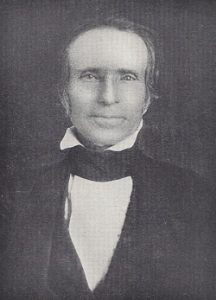 Rev. McIver’s new call was to serve the Chesterfield, Pine Tree, and Sandy Run churches which had a total communicant membership of just under one hundred fifty. At his second meeting as a member of Fayetteville Presbytery he was elected stated clerk. One of his first contributions to the work of presbytery was delivering the charge to Jesse H. Turner at his installation in the First Church, Fayetteville. Much of his pastoral work was for brief calls or as a temporary stated supply. By April 1817, his call changed because he was pastor of the Sardis and Smyrna congregations which had both been recently organized. Between the years 1819 and 1821 he served short calls and/or supplied the Brown Marsh, St. Paul’s, and Elizabeth congregations. From 1822 to 1828 he was listed in the annual reports for Fayetteville Presbytery as “without pastoral charge,” which means that he was not a called pastor nor had he been assigned to supply a particular church in presbytery. When the Presbyterian Church in the United States of America (PCUSA) divided into Old and New Schools in 1837, Fayetteville Presbytery was, along with a considerable majority of Presbyerians in the South, a member of the Old School. McIver supplied the Galatia, McPherson, and Mt. Thuron churches for a few years after the division of the PCUSA and beginning in 1842 he ministered to the sheep in the Galatia and Barbecue churches continuing until 1847. For some reason he is not listed as a member of Fayetteville Presbytery, 1848-1850, and a different minister was serving the Galatia and Barbecue churches for those years. However, he continued his scribal work for his presbytery and synod as their stated clerks. During his years of ministry he was for at least one term a Director of Union Theological Seminary, which was the Old School seminary under the direction of the synods of North Carolina and Virginia.
Rev. McIver’s new call was to serve the Chesterfield, Pine Tree, and Sandy Run churches which had a total communicant membership of just under one hundred fifty. At his second meeting as a member of Fayetteville Presbytery he was elected stated clerk. One of his first contributions to the work of presbytery was delivering the charge to Jesse H. Turner at his installation in the First Church, Fayetteville. Much of his pastoral work was for brief calls or as a temporary stated supply. By April 1817, his call changed because he was pastor of the Sardis and Smyrna congregations which had both been recently organized. Between the years 1819 and 1821 he served short calls and/or supplied the Brown Marsh, St. Paul’s, and Elizabeth congregations. From 1822 to 1828 he was listed in the annual reports for Fayetteville Presbytery as “without pastoral charge,” which means that he was not a called pastor nor had he been assigned to supply a particular church in presbytery. When the Presbyterian Church in the United States of America (PCUSA) divided into Old and New Schools in 1837, Fayetteville Presbytery was, along with a considerable majority of Presbyerians in the South, a member of the Old School. McIver supplied the Galatia, McPherson, and Mt. Thuron churches for a few years after the division of the PCUSA and beginning in 1842 he ministered to the sheep in the Galatia and Barbecue churches continuing until 1847. For some reason he is not listed as a member of Fayetteville Presbytery, 1848-1850, and a different minister was serving the Galatia and Barbecue churches for those years. However, he continued his scribal work for his presbytery and synod as their stated clerks. During his years of ministry he was for at least one term a Director of Union Theological Seminary, which was the Old School seminary under the direction of the synods of North Carolina and Virginia.
It may be hard to believe given Rev. McIver’s work as clerk, but it seems he was quite absentminded—a characteristic that would likely have made his clerk work more difficult. A case in point has been provided by James McKenzie in his history of the Barbecue Church. One Sunday morning Pastor McIver was travelling in his wagon to the Barbecue Church to lead worship. The congregation was gathered in the yard of the church by the road awaiting his arrival as they always did. He was punctual arriving as expected, but the trouble was he was so deep in thought with his eyes fixed on the road that he rolled right past the congregation as they watched him disappear over the next hill. The congregants waited. As expected, he soon returned, entered the church as though nothing had happened, and led the service. Maybe, the members failed to shout to get his attention because they knew he would be back due to similar incidents of absentmindedness in the past.
Father McIver, as he was often called, had conversed and preached in both English and Gaelic, but when he was on his death bed he resorted to Gaelic as he requested to be buried in his time-honored silken gown and Geneva bands. Pastor, Clerk, and Father McIver enjoyed a stable ministry as the pastor of the Galatia and Barbeque Churches until his death on January 18, 1850. When Fayetteville Presbytery received a report of the death of Rev. McIver, the moderator, who was Archibald McQueen, appointed a committee of two to compose a memorial for “Father McIver.” He was buried in Fayetteville Cemetery in a grave marked by a plain and simple stone purchased by his friends. He was survived by his widow, Sarah.
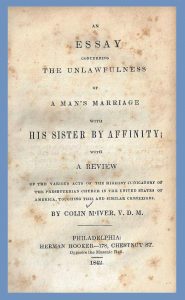 Rev. Colin McIver was not only a devoted keeper of minutes at different levels but he was also a frequent participant in prosecuting discipline cases which resulted in his publication of a few items related to those cases. One issue that particularly concerned him was the marriage of a widower to his deceased wife’s sister; the crux of the case was application of a statement in the Westminster Confession of Faith, 24:4, to such marriages. He spearheaded the disciplinary pursuit of two such marriages that occurred in Fayetteville Presbytery. The first one resulted in him publishing his views in a pamphlet with a lengthy title even for the era but it will be abbreviated here, Ecclesiastical Proceedings, in the Case of Mr. Donald McCrimmon, A Ruling Elder of the Presbyterian Church, who was Suspended from Sealing Ordinances, and from the Exercise of his Office, by the Session of Ottery’s Church…[etc.], which was published in Fayetteville in 1827. Then just fifteen years later another case occurred in McIver’s presbytery but this one involved a minister named Archibald McQueen. The case went all the way to the general assembly, created extensive debate, considerable press coverage, and such a frenzy that some were concerned about the Old School Presbyterians splitting. The driving force behind the McQueen case was, once again, Father McIver. In order to bolster his presentation before the highest judicatory, McIver published contemporaneous with the first year of the proceedings his little book, Essay Concerning the Unlawfulness of a Man’s Marriage with his Sister by Affinity; with a Review of the Various Acts of the Highest Judicatory of the Presbyterian Church in the United States of America, Touching This and Similar Connections, Philadelphia, 1842. He also had a sermon published, the title of which will once again be abbreviated, An Humble Attempt to Illustrate the Character and Obligations of a Minister of the Gospel of Christ; in a Sermon, Preached…at the Ordination of the Rev’d. William D. Snodgrass…[etc.], Fayetteville, 1820. He also edited The Southern Preacher: A Collection of Sermons from the Manuscripts of Several Eminent Ministers of the Gospel, Residing in the Southern States…[etc.], Philadelphia, 1824, and he edited The Virginia and North Carolina Presbyterian Preacher…[etc.], Fayetteville, 1828.
Rev. Colin McIver was not only a devoted keeper of minutes at different levels but he was also a frequent participant in prosecuting discipline cases which resulted in his publication of a few items related to those cases. One issue that particularly concerned him was the marriage of a widower to his deceased wife’s sister; the crux of the case was application of a statement in the Westminster Confession of Faith, 24:4, to such marriages. He spearheaded the disciplinary pursuit of two such marriages that occurred in Fayetteville Presbytery. The first one resulted in him publishing his views in a pamphlet with a lengthy title even for the era but it will be abbreviated here, Ecclesiastical Proceedings, in the Case of Mr. Donald McCrimmon, A Ruling Elder of the Presbyterian Church, who was Suspended from Sealing Ordinances, and from the Exercise of his Office, by the Session of Ottery’s Church…[etc.], which was published in Fayetteville in 1827. Then just fifteen years later another case occurred in McIver’s presbytery but this one involved a minister named Archibald McQueen. The case went all the way to the general assembly, created extensive debate, considerable press coverage, and such a frenzy that some were concerned about the Old School Presbyterians splitting. The driving force behind the McQueen case was, once again, Father McIver. In order to bolster his presentation before the highest judicatory, McIver published contemporaneous with the first year of the proceedings his little book, Essay Concerning the Unlawfulness of a Man’s Marriage with his Sister by Affinity; with a Review of the Various Acts of the Highest Judicatory of the Presbyterian Church in the United States of America, Touching This and Similar Connections, Philadelphia, 1842. He also had a sermon published, the title of which will once again be abbreviated, An Humble Attempt to Illustrate the Character and Obligations of a Minister of the Gospel of Christ; in a Sermon, Preached…at the Ordination of the Rev’d. William D. Snodgrass…[etc.], Fayetteville, 1820. He also edited The Southern Preacher: A Collection of Sermons from the Manuscripts of Several Eminent Ministers of the Gospel, Residing in the Southern States…[etc.], Philadelphia, 1824, and he edited The Virginia and North Carolina Presbyterian Preacher…[etc.], Fayetteville, 1828.
BY BARRY WAUGH
The memorial composed for Colin McIver by Fayetteville Presbytery has been transcribed from the minutes and is available in PDF by clicking HERE.
Notes—The information about McIver’s three month missionary call in 1812 was added September 13, 2016, and is from the assembly minutes for that year. For a brief biography of Henry Kollock on Presbyterians of the Past, click HERE. The Salkehatchie Presbyterian Church has several variations of its name including, “Salt Catcher,” “Saltketcher,” or “Saltcatcher,” as well as another variation “Saltkehatchee,” which was the name used when it was incorporated as “Saltkehatchee Independent Presbyterian Church,” December 17, 1808. The minutes of Fayetteville Presbytery state that McIver died January 18, 1850, but McKenzie says he died January 19, 1850. There are some discrepancies regarding the dates of McIver’s candidacy, licensure, and ordination, as well as church names that are not always spelled the same. A brief article by the author of this site titled, “Carolina Scots, the Westminster Confession, and a Deceased Wife’s Sister,” was published in The Confessional Presbyterian 9, 2013, beginning on page 48.
Sources—The header image is two pictures combined of the Salkehatchie Church site. James D. McKenzie’s book is titled, History of Barbecue Presbyterian Church, Harnett County, North Carolina, which was self-published in 1965. Information related to McIver and the Fayetteville Church was found in both History of First Presbyterian Church, Fayetteville, North Carolina, by Harriot Sutton Rankin, 1928, and an earlier book by A. L. Phillips titled, An Historical Sketch of the Presbyterian Church of Fayetteville, February 3, 1889. George Howe’s two volumes on the history of the Presbyterian Church in South Carolina were consulted, as well as Guide to Presbyterian Ecclesiastical Names and Places in South Carolina, 1685-1986, by Joseph B. Martin, III, which was published in South Carolina Historical Magazine, vol. 90:1, 2, January-April 1989. Also, R. H. Stone’s, A History of Orange Presbytery, 1770-1970, Greensboro, 1970, is helpful because North Carolina, Georgia, part of Tennessee, and South Carolina were originally the geographic area of Orange Presbytery. As the years passed, presbyteries were formed from portions of Orange Presbytery’s geographic area. For example, just about the time McIver moved to North Carolina, Fayetteville Presbytery was formed from Orange in 1812. The portrait of McIver was provided by the PCA Historical Center, St. Louis, Missouri, Wayne Sparkman, Director. The map of Scotland is from Rand-McNally Pocket Atlas of the World, Historical-Political-Commercial, New York, 1906, as in digital form on Internet Archive.



